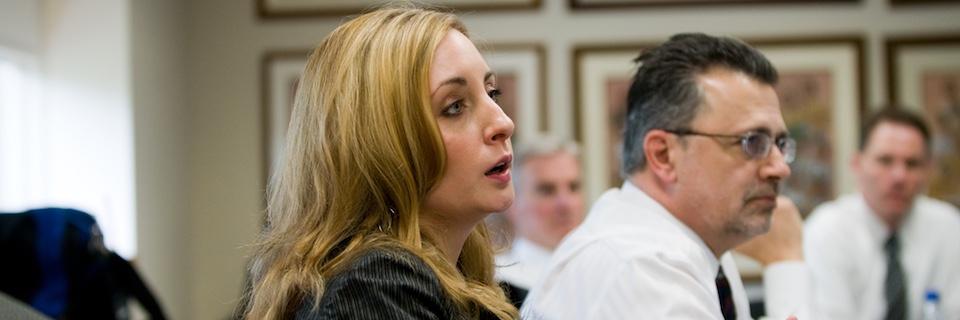With Nearly 1,000 Graduates, RU Executive MBA Celebrates 40 Years

Innovation and learning from the best were at the forefront when the Rev. Nicholas S. Rashford, S.J., set about creating the Executive Fellows MBA program at Rockhurst University (then College) in 1978 — one of the earliest such programs in the country.
This year the program — now known as simply the Executive MBA and boasting nearly 1,000 alumni — celebrates the 40th anniversary of its first class of graduates.
After arriving at Rockhurst, Fr. Rashford and the late Tom Lyon, Ph.D., professor of finance, visited the Kellogg School of Management at Northwestern University and the Booth School of Business at the University of Chicago to glean ideas. He also drew from his own MBA experience at the MIT Sloan School of Management.
One of their takeaways, Fr. Rashford said, was to structure the program on a Friday-Saturday schedule so that one day would be from the student’s own time and one would be from the employer, which generally paid the tuition. He said this was also part of their marketing strategy — when vice presidents and other company executives were said to be away from the office at Rockhurst for class, it helped “put Rockhurst on the map.”
Another early innovation was the creation of a moot boardroom classroom where students would surround a boardroom table with executives from a company who would present a live case study and generate discussion regarding solutions. Bringing real-world corporate challenges into the classroom was part of the program from the beginning.
An internal challenge was getting faculty on board, said Fr. Rashford.
“It was always difficult getting faculty to teach,” he said. “They were afraid the students would know the material better than they did, but it sharpens them.”
Since its founding, the program has evolved over the years to serve the needs of executives and rising executives, said Craig Sasse, Ph.D., curriculum director of the Executive MBA and associate professor of management.
“What students need from the program hasn’t changed much over time – they’re looking to improve their careers and gain new skills,” said Sasse. “But their need for flexibility due to travel and family schedules has changed. Because technology allows it, they are looking for flexibility.”
Changes in format and delivery have allowed that flexibility, with approximately 35% of the content now delivered online. All classroom lectures and discussions are available through video capture for students to watch when they must miss class or for review. With more of the content available online, on-ground class time has been reduced. Starting this fall, the cohorts will meet once a month on Friday and Saturday, with teams strongly encouraged to meet weekly.
Anthony Tocco, Ph.D., professor of accounting, said that one difference he has noticed between early cohorts and today’s is that there are now middle managers – people in their 30s – who are entering the program looking to advance into director-level positions rather than strictly executives. The desire for advancement is one thing they all have had in common, he said.
“We used to tell employers who sponsored their employees, ‘You’d better move them up, because they will be dissatisfied if you don’t.’ They all wanted to take the knowledge they learned at Rockhurst and apply it.”
On April 25, the Executive MBA program will hold a 40th anniversary celebration featuring Fox Sports Kansas City’s Joel Goldberg speaking on leadership and creating a championship culture. Visit rockhurst.edu/events/joelgoldberg for more information.







